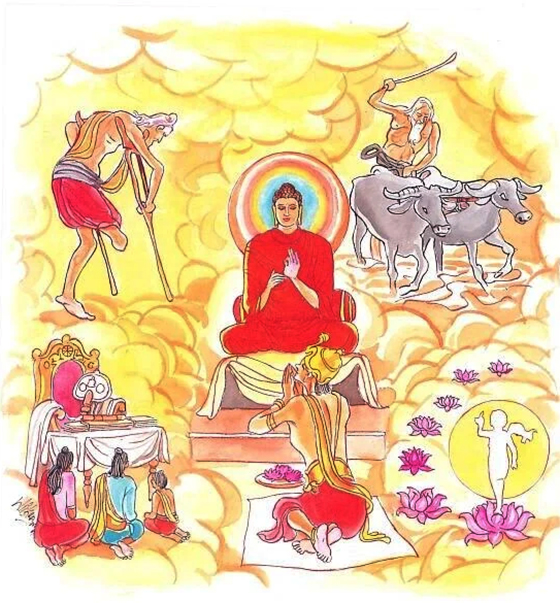Verse 182: Hard to gain is birth as man; hard is the life of mortals; hard to get is the opportunity of hearing the Ariya Dhamma (Teaching of the Buddhas); hard it is for a Buddha to appear.
The Story of Erakapatta the Naga King
While residing near Baranasi the Buddha uttered Verse (182) of this book, with reference to Erakapatta, a king of nagas (dragons).
Once there was a naga king by the name of Erakapatta. In one of his past existences during the time of Kassapa Buddha he had been a bhikkhu for a long time. Through worry (kukkucca) over a minor offence he had committed during that time, he was reborn as a naga. As a naga, he waited for the appearance of a Buddha. Erakapatta had a very beautiful daughter, and he made use of her as a means of finding the Buddha. He made it known that whoever could answer her questions could claim her for a wife. Twice every month, Erakapatta made her dance in the open and sing out her questions. Many suitors came to answer her questions hoping to claim her, but no one could give the correct answer.
One day, the Buddha saw a youth named Uttara in his vision. He also knew that the youth would attain Sotapatti Fruition in connection with the questions put by the daughter of Erakapatta the naga. By then the youth was already on his way to see Erakapatta’s daughter. The Buddha stopped him and taught him how to answer the questions. While he was being taught, Uttara attained Sotapatti Fruition. Now that Uttara had attained Sotapatti Fruition, he had no desire for the naga princess. However, Uttara still went to answer the questions for the benefit of numerous other beings.
The first four questions were:
- Who is a ruler?
- Is one who is overwhelmed by the mist of moral defilements to be called a ruler?
- What ruler is free from moral defilements?
- What sort of person is to be called a fool?
The answers to the above questions were:
- He who controls the six senses is a ruler.
- One who is overwhelmed by the mist of moral defilements is not to be called a ruler; he who is free from craving is called a ruler.
- The ruler who is free from craving is free from moral defilements.
- A person who hankers after sensual pleasures is called a fool.
Having had the correct answers to the above, the naga princess sang out questions regarding the floods (oghas) of sensual desire, of renewed existence, of false doctrine and of ignorance, and how they could be overcome. Uttara answered these questions as taught by the Buddha.
When Erakapatta heard these answers he knew that a Buddha had appeared in this world. So he asked Uttara to take him to the Buddha. On seeing the Buddha, Erakapatta related to the Buddha how he had been a bhikkhu during the time of Kassapa Buddha, how he had accidentally caused a grass blade to be broken off while travelling in a boat, and how he had worried over that little offence for having failed to do the act of exoneration as prescribed, and finally how he was reborn as a naga. After hearing him, the Buddha told him how difficult it was to be born in the human world, and to be born during the appearance of the Buddhas or during the time of their Teaching.
Then the Buddha spoke in verse as follows:
Verse 182: Hard to gain is birth as man; hard is the life of mortals; hard to get is the opportunity of hearing the Ariya Dhamma (Teaching of the Buddhas); hard it is for a Buddha to appear.
The above discourse benefited numerous beings. Erakapatta being an animal could not attain Sotapatti Fruition then and there.
Dhammapada Verse 182
Erakapattanagaraja Vatthu
Kiccho manussapatilabho
kiccham maccana jivitam
kiccham saddhammassavanam
kiccho buddhanamuppado.
Source: Tipitaka







